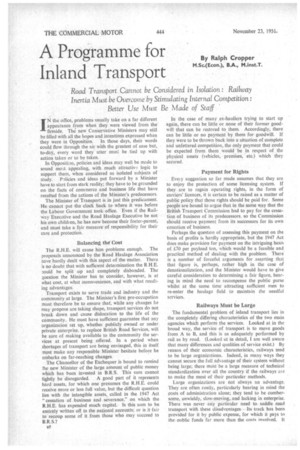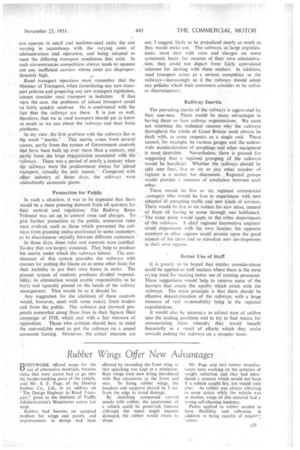A Programme for By Ralph Cropper Inland Transport M.Sc.(Econ.), BA. , M.inst.T.
Page 42

Page 43

If you've noticed an error in this article please click here to report it so we can fix it.
Road Transport Cannot be Considered in Isolation : Railway Inertia Must be Overcome by Stimulating Internal Competition: Better Use Must Be Made of Staff.
IN the office, problems usually take on a far different appearance from when they were viewed from the fireside. The new Conservative Ministers may still be filled with all the hopes and intentions expressed when
they were in Opposition. In those days, their words could flow through the air with the greatest of ease but, to-day, every word they utter must be tied up with action taken or to be taken.
In Opposition, policies and ideas may well be made to sound most appealing, with much attractiv.: logic to support them, whcn considered as isolated subjects of study. Pllicies and ideas put forward by a Minister have to start from stark reality; they have to be grounded on the facts of commerce and business life that have resulted from the actions of the Minister's predecessors.
The Minister of Transport is in just this predicament. He cannot put the clock back to where it was before the Labour Government took office. Even if the Railway Executive and the Road Haulage Executive be not his own children, he has now become their foster-parent, and must take a fair measure of responsibility for their care and protection.
Balancing the Cost The R.H.E. will cause him problems enough. The proposals announced by the Road Haulage Association nave hardly dealt with this aspect of the matter. There is no doubt that. with sufficient determination the R.H.E. :ould he split ,up and completely disbanded. The vestion the Minister has to consider, however, is at what cost, at what inconvenience, and with what resulting advantages.
Transport exists to serve trade and industry and the community at large. The Minister's first pre-occupation must therefore be to ensure that, while any changes he may propose are taking shape, transport services do not break down and cause dislocation to the life of the community.. He must have sufficient guarantee that any organization set up, whether publicly owned or under. private enterprise, to replace British Road Services, will be sure of making available to the community the services at present being offered. In a period when shortages of transport are being envisaged, this in itself must make any responsible Minister hesitate before he embarks on far-reaching changes.
The Chancellor of the Exchequer is bound to remind the new Minister of the large amount of public money which has been invested in B.R.S. This sum cannot lightly be disregarded. A good part of it represents hard assets, for which one presumes the R.H.E. could receive more or less full value, but the difficult question lies with the intangible assets, called in the 1947 Act "cessation of business and severance," on which the R.H.E. has expended much capital. Is this sum to be entirely written off in the national accounts; or is it fair to recoup some of it from those who may succeed to B.R.S.?
s8 In the case of many ex-hauliers trying to start up again, there can be little or none of their former goodwill that can be restored to them. Accordingly, there can be little or no payment by them for goodwill. If they were to be thrown back into a situation of complete and unfettered competition, the only payment that could be expected from them would be in respect of the physical assets (vehicles, premises, etc.) which they secured.
Payment for Rights Every suggestion so far made assumes that they are to enjoy the protection of some licensing system. If they are to regain operating rights, in the form of carriers' licences, it is certain to be raised as a matter of public policy that those rights should be paid for. Some people are bound to argue that in the .same way that the British Transport Commission had to pay for the cessation of business of its predecessors; so the Commission should receive payment from its successors for its own cessation of business.
Perhaps the question of assessing this payment on the basis of profits is hardly appropriate, but the 1947 Act does make provision for payment on the intriguing basis of £70 per payload ton, Vt hich would be a feasible and practical method of dealing with the problem. There is a number of forceful arguments for asserting that that figure is, perhaps, rather high in. the case of denationalization, and the Minister would have to give careful consideration to determining a fair figure, bearing in mind the need to recompense the public purse whilst at the same time attracting sufficient men to re-enter the haulage field to maintain the needful s;:rvices.
Railways Must be Large The fundamental problem of inland transport lies in the completely differing characteristics of the two main agencies which perform the services. Looked at in the broad way, the service of transport is to move goods from A to B, and this is as adequately performed by rail as by road. (Looked at in detail, I am well aware that many differences and qualities of service exist.) By reason of their economic characteristics, railways tend to be large organizations. Indeed, in many ways they cannot secure the full advantage of their system without being large; there must be a large measure of technical standardization over all the country if the railways ale to make the most of their particular methods.
Large organizations are not always an advantage. They are often costly, particularly bearing in mind the costs of administration alone; they tend to be cumbersome, unwieldy, slow-moving, and lacking in enterprise. There was never any particular need to saddle road transport with these disadvantages. Itstrack has been provided for it by public expense, for which it pays to the nubile funds far more than the costs involved. It
can operate in, small and medium-sized units, the. size varying in accordance with the varying costs of administration :and operation, and being adapted to meet the differing transport conditions that exist. In such circumstances competition always tends to squeeze out any inefficient carriers whose costs are disproportionately high.
!Road transport operators must remember that the Minister of TranSport.when forninlating any new transpOrt policies and preparing any new transport legislation,
cannot consider road transport in isolation. If that were the case, the problems of inland transport could b fairly quickly resolved. He is confronted with the fact that the railways are there It is just as well, th refore, that we in toad transport should get to know a much as we can about the railways and their basic p oblems.
In my view, the first problem with the railways lies in
th 'word " inertia." This inertia arises from several uses, partly from the system of Government controls tlaL have been built up over more than a century, and partly from the large ergariiiiition associated with the raiways, .There was a period of nearly a-century when e railways were the predominant means for inland risportvirtually the onl,. means.' Compared with er industry of those .:days, the railways Were undoubtedly economic giants..
Protection for Public In such a situation, it was to be expected that there Would be a most pressing demand .frOtt all quarters for their control. and .regulation .The Railway Rates Tribunal was set .up,ter'ecintrol rates and .charges. To , give .further proteetiba to the public, numerous rules were evolved, such 'asthose which prevented the railways-from granting-undue-preference to some customers or to discriminate uinjUstly.between different customers.
In those clays, these rules and controls were justified. To-day they are largely outdated. They help to produce the inertia under which the railways. labour. The continuance of this system provides the railways with excuses for putting the blame on to some other body for their inability to put their own house in order. The present system of controls produces divided responsibilitY; its elimination would enable responsibility to be fairly and squarely pinned on the heads of the railway management. That would be as it should be.
Any suggestion for the abolition of these controls would, however, meet with some outcry from traders and from the public. The railways put forward proposals somewhat along these lines in their Square Deal campaign. of 1938, which met with a fair measure of opposition. Those who criticize should bear in mind the unavoidable need to put the railways on a sound economic footing. Moreover, the critics' interests are
not, I suggest, likely to be prejudiced nearly as much as they would make out. The-railways, as-large organizations; must deal with rates and charges on some systematic basis; for reasons of their own administration: they could not depart . from fairly centralized schemes for dealing with these matters'. In addition, road transport exists as a serious competitor to the railways-increasingly so if the railways should adopt any policies which their customers considecto be unfair or discriminatory.
Railway Inertia The prevailing inertia of the railways is aggravated by their one-ness. There would be many advantages in havingthree or four railway organizations. We .must not Minimize the technical reason why. the railways throughout the whole of Great Britain rat& always be dealt with, in some respects, as a single unit. There cannot, for example, be various gauges and the nationwide standardization of couplings and other equipment is most desirable. Nevertheless; there is ground for suggesting that a regional grouping of the railways would be beneficial Whether the. railways should be Split into: four, five or six or any other ,number of regions ,is • a. matter for discussion. „Regional groups would provide a measure of emulation between each other.
There would be five or Six regional commercial zianagers Who would be free to experiment with new seherneS'of;attracting traffic and new kinds of services: There would be five or six outlets for new ideas, instead of them all having to come through one bottleneck. The same pOint would apply to the other departments of the railwa.?is. A chief regional locomotive engineer could. experiment with his own fancies; his opposite numbers in other legions could pounce upon the good aspects of his ideas and so stimulate new developMents in their own regions.
Better Use of Staff
It is greatly to be hoped that similar considerations could be applied to staff matters where there is the Most crying need for making better use of existing personnel. These suggestions would help to remove some of the barriers that create the apathy which exists With the railways. The main principle is that there should be effective decentralization of the railways, with a large measure of real responsibility lying in the regional organizations.
It would also be necessary to attract men of calibre into the leading positions and to try to find means for remunerating them whereby they Would benefit financially as a result of efforts which they make towards putting the railways on a sounder basis.












































































